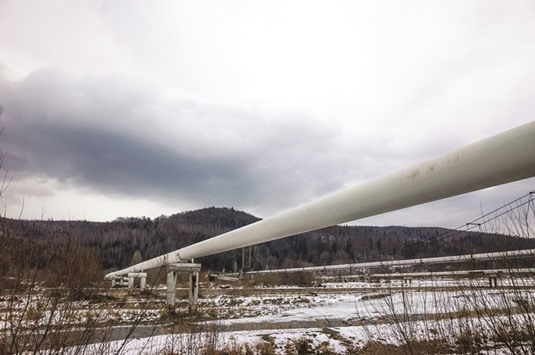Even after three years, there’s still no sign that the slump in European natural gas prices is about to end.
Front-month contracts for the fuel are trading near six-year lows in the Netherlands and UK, while Citigroup to Marex Spectron Group and Vattenfall AB predict further declines. The slump seems made of Teflon; since 2013, benchmark gas rates have brushed off a run of political and environmental dramas that would normally lift prices and instead tracked a deepening global oversupply.
Prices barely flickered last week when Ukraine, the largest transit country for Russian gas to the EU, warned of the potential for full-out war with its eastern neighbour and Europe’s biggest supplier. Traders had already shrugged off the Netherlands’ decision to restrict output at Europe’s largest gas field because of earthquakes, Britain’s vote to leave the EU and the region’s widespread opposition of fracking to extract the fuel.
“The impact of these political issues on pricing has been minuscule,” said Mark Devine, the director of Energy Trading Consultancy Ltd in Yarm, England, and a former gas trader at Norway’s Statoil. “In short, we have a bit of a supply glut that’s more influential.”
UK gas prices for 2017 may fall closer to $4 per million British thermal units from more than $5 amid an expanding supply glut, Ed Morse, head of commodities research at Citigroup, said in a note on Monday. Marex Spectron, a London-based energy broker, underlined its bearish view on gas last week, while traders surveyed by Bloomberg have forecast declines in all but three weeks since at least April 2015.
Front-month Dutch gas fell for the second day, sliding 0.7% by 11.16am in London. The equivalent UK contract was little changed after having the biggest intraday decline since 2010 on Friday.
Part of the downturn has been due to a two-year slump in oil that ended last year, said Devine at Energy Trading Consultancy. About half of gas contracts in Europe are linked to the price of crude with a six-to-nine month lag, which fell 35% in 2015 before rising more than 30% this year.
Large gas producers outside the EU are fighting for market share by expanding exports. Russian shipments into Europe rose 14% in the first half from a year earlier, and Norwegian supplies to the UK are 21% above the five-year average. The extra imports have neutralised the influence of declining output in the EU, where production has fallen to its lowest level since 1971.
Gas traders and network operators are also confident supply needs will be met through the expansion of liquefied natural gas trading. Last year, about $120bn of LNG was physically bought and sold, making it the second-largest commodity transacted globally, surpassing iron ore, according to Christian Lelong, a New York-based analyst with Goldman Sachs Group Inc
Producers were expected to add 50mn metric tonnes of LNG capacity by the end of the year, equivalent to a fifth of current global demand, according to Sanford C Bernstein & Co. Some of those projects have been delayed, meaning global gas markets haven’t felt the full effect of oversupply yet, Citigroup’s Morse said.
“As LNG supply from the US increases, alongside growth from Australia and elsewhere, global natural gas prices could buckle under the glut,” Morse wrote.
Worldwide gas production in 2015 was 3.5tn cu m, 70bn cu m higher than consumption, according to BP data. That’s the biggest surplus in at least a decade.
With climate concerns, gas producers are hoping demand for the fuel will be higher, serving as a replacement for more- polluting coal. So far, better margins at coal plants, energy efficiency and warm weather have kept the need for gas muted.
EU gas consumption fell 19% in the decade through 2015, BP data show. Coal demand declined 17% in the same period and usage is forecast to fall further this year.
While rising coal costs may help lift demand for gas, prices will by capped by overhanging supply, said Jip van Krimpen, a gas portfolio manager at Vattenfall Energy Trading in Amsterdam.
“With the global glut in gas, any price increase will quickly be arbitraged out,” he said.

Sections of the Bratstvo (top) and Soyuz gas pipelines cross a river near Ivano-Frankvisk, Ukraine. Europe gas prices barely flickered last week when Ukraine, the largest transit country for Russian gas to the EU, warned of the potential for full-out war with its eastern neighbour and Europe’s biggest supplier.
